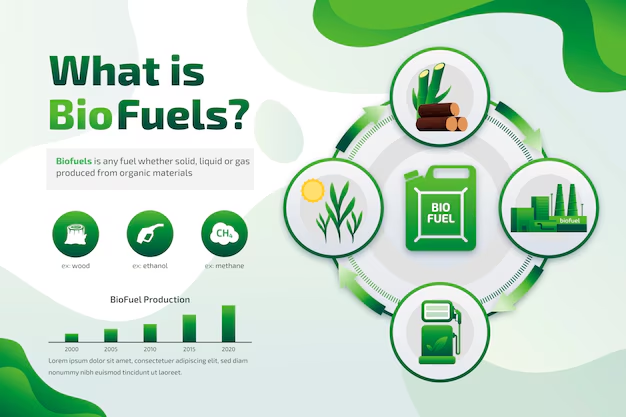
A Story of Energy Transformation
Electricity flickers out often in a small Indian village, and kerosene lamps are the fallback. Young entrepreneur Raj had envisioned change. Equipped with only a degree in agricultural science and a vision for cleaner energy, he started experimenting with converting agricultural waste into biofuels. It was not just a journey to light homes but a way to light possibilities of the future powered by sustainable biofuels. Raj’s story speaks to a larger movement in innovation toward renewable energy sources and, more especially, biofuels-the solution that has promised to change how we power our world.
What are biofuels?
Biofuels are a renewable source of energy, extracted from biological matter like plants, algae, and animal waste. Unlike fossil fuels, future of biofuels can replenish within the lifetime of humans, which means they have become a potential alternative to overcome environmental and economic concerns associated with the use of conventional energy sources. Biofuels are broadly classified into three categories:
- First Generation Biofuels: These biofuels are extracted from edible crops such as sugarcane, corn, and soybeans. These comprise ethanol and biodiesel.
- Second Generation Biofuels: These are derived from non-food biomass such as agricultural waste, wood chips, and grasses.
- Third Generation Biofuels: Obtained from algae, these biofuels offer high yields with negligible impacts on the environment.

Biofuels’ Innovation Potential
Advanced Feedstock Utilization
Advanced feedstocks is one of the most exciting areas of innovation in biofuels. Unlike the first generation, which raised red flags regarding food security, second and third generations target non-food biomass. Algae have been one of the most promising species because they carry a large amount of oil and grow extremely fast.
The production potential of algae-based biofuels would be about 140 billion liters per year and could supply 7% of the world’s transportation fuel demands, as estimated by the International Renewable Energy Agency’s report of 2022.
Genetic Engineering and Microbial Advancements
Scientists are using genetic engineering techniques to develop microbes that can convert biomass into biofuels efficiently. For instance, scientists at the University of California have created strains of yeast genetically engineered for the production of ethanol that has been 40% more efficient than traditional approaches.
New Technologies
Breaking Technological Barrier
Breakthroughs in technology will shape the future of the biofuels industry in the following ways:
Hydrothermal Liquefaction (HTL): In this process, wet feedstocks are converted into liquid biocrude oil that can be refinable to diesel and jet fuels. HTL is also capable of making drop-in advanced biofuels.
Synthetic Biology: Improvements in synthetic biology ensure the availability of engineered enzymes for biomass degradation that could reduce time spent on it.
Policy Support and Investments
Biofuels are propelled by government subsidies and mandates globally. For instance, the European Union has set a target of 14% of transportation energy from biofuels by 2030 under its RED II. In the United States, the Inflation Reduction Act of 2022 has allocated $369 billion to clean energy, some of which is spent on advanced biofuels.
Challenges in Biofuels
Economic Viability
Though the cost is decreasing through technology, there are still some economic challenges associated with biofuels. Advanced biofuels are a bit costlier than fossil fuels. Cost parity is very important for their widespread application.
Land Use and Food Security
This production of feedstocks for biofuel competes with food crops and can cause further deforestation. The cultivation can also drive the prices of foods up, for example, corn prices soared due to the biofuel production in the 2007-2008 food crisis. Attention needs to be directed towards the second- and third-generation biofuels in reducing these effects.
Environmental Impact
Biofuels are marketed as a green product, but the process of producing them is not so friendly. The growth of feedstocks results in loss of habitats and emissions of carbon. Some crops use a lot of water and fertilizers, which causes further stress on local ecosystems.
Infrastructure Issues
The integration of biofuels with the existing fuel infrastructure is problematic. Most existing infrastructure is petroleum-based fuels. This means there is a need to change the existing infrastructure to accommodate biofuels.
Historical Lesson of Edible Oil
The development of biofuels follows the development pattern of the edible oil industry. Biofuels, like edible oils, need refining processes in order to be useable. Improvements related to refining—similar to edible oil refining—are thus crucial for improving biofuel quality.
For instance, the edible oil industry is changing toward sustainability through cold-pressed oils and the reduction of the environmental impact of edible oil production. These are lessons that can be applied to biofuels. Companies that invest in sustainable practices for products like mustard oil and coconut oil can inspire biofuel producers to focus on environmental stewardship.
Biofuels and the Global Energy Transition
As a result of such efforts by nations to achieve their climate goals, the face of the world’s energy is witnessing a dramatic shift. At its core is the development of biofuels for those hard-to-electrify sectors like aviation and shipping. Sustainable aviation fuels (SAFs), made from biofuels, may bring a reduction in aviation’s carbon footprint by as much as 80 percent, according to IATA.
Moreover, if the future of petrochemical oils is not certain, biofuels are a much more promising alternative. They are in line with the world’s efforts to be sustainable, including the Paris Agreement, to keep warming below 1.5°C.
Conclusion: A Way Forward
Biofuels are a very attractive source of renewable energy; however, innovation in feedstocks, technology, and policy support drives it too. Economic viability and environmental concerns have to be overcome to unlock the full potential of biofuels. The solutions that will eventually power the global energy transition are sure to strike a balance between innovation and sustainability.
But in that transformative potential lies one final question: how do we seize those innovations to make the energy future cleaner and more equitable?



